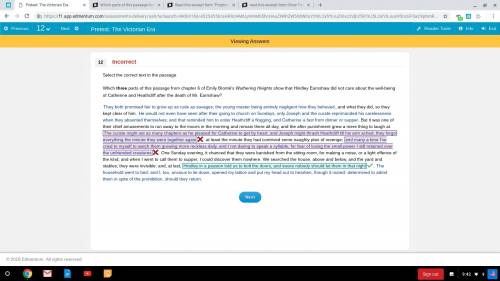
English, 20.10.2019 01:30 linkaye3031
Which parts of this passage from chapter 6 of emily brontë's wuthering heights show that hindley earnshaw did not care about the well-being of catherine and heathcliff after the death of mr. earnshaw?
they both promised fair to grow up as rude as savages; the young master being entirely negligent how they behaved, and what they did, so they kept clear of him. he would not even have seen after their going to church on sundays, only joseph and the curate reprimanded his carelessness when they absented themselves; and that reminded him to order heathcliff a flogging, and catherine a fast from dinner or supper. but it was one of their chief amusements to run away to the moors in the morning and remain there all day, and the after punishment grew a mere thing to laugh at. the curate might set as many chapters as he for catherine to get by heart, and joseph might thrash heathcliff till his arm ached; they forgot everything the minute they were together again: at least the minute they had contrived some naughty plan of revenge; and many a time i’ve cried to myself to watch them growing more reckless daily, and i not daring to speak a syllable, for fear of losing the small power i still retained over the unfriended creatures. one sunday evening, it chanced that they were banished from the sitting-room, for making a noise, or a light offence of the kind; and when i went to call them to supper, i could discover them nowhere. we searched the house, above and below, and the yard and stables; they were invisible: and, at last, hindley in a passion told us to bolt the doors, and swore nobody should let them in that night. the household went to bed; and i, too, anxious to lie down, opened my lattice and put my head out to hearken, though it rained: determined to admit them in spite of the prohibition, should they return.

Answers: 2
Another question on English

English, 22.06.2019 01:00
Read the excerpt from act 1 of a doll's house. helmer: nora! [goes up to her and takes her playfully by the ear.] the same little featherhead! suppose, now, that i borrowed fifty pounds today, and you spent it all in the christmas week, and then on new year's eve a slate fell on my head and killed me, and— nora: [putting her hands over his mouth]. oh! don't say such horrid things. helmer: still, suppose that happened, —what then? nora: if that were to happen, i don't suppose i should care whether i owed money or not. helmer: yes, but what about the people who had lent it? nora: they? who would bother about them? i should not know who they were. helmer: that is like a woman! but seriously, nora, you know what i think about that. no debt, no borrowing. there can be no freedom or beauty about a home life that depends on borrowing and debt. we two have kept bravely on the straight road so far, and we will go on the same way for the short time longer that there need be any struggle. nora: [moving towards the stove]. as you , torvald. how does the interaction between helmer and nora advance the plot? nora realizes that helmer will completely disapprove of her having borrowed money, so she has to continue to keep it a secret from him. nora realizes that she and helmer have the same ideas about financial issues, and the conversation brings them closer together later in the play. helmer realizes that nora is more responsible with money than he originally thought, and he trusts her more with finances later in the play. nora realizes that helmer knows a lot more about borrowing and lending, and she will seek his input later when she needs it.
Answers: 1


English, 22.06.2019 07:00
Which two lines in this excerpt from leo tolstoy's the death of ivan ilyich together use symbolism to indicate that death is approaching?
Answers: 1

English, 22.06.2019 09:30
Which detail should most likely be cited in a historical criticism of a literary work ? the author's use of dialogue in the literary work the impact the literary work has on modern audiences the popular cultural trends of the time when the work was written the audience that the literary work is likely to reach in the future
Answers: 1
You know the right answer?
Which parts of this passage from chapter 6 of emily brontë's wuthering heights show that hindley ear...
Questions




Mathematics, 23.09.2019 20:30

English, 23.09.2019 20:30

Mathematics, 23.09.2019 20:30

Social Studies, 23.09.2019 20:30


Mathematics, 23.09.2019 20:30

Mathematics, 23.09.2019 20:30


Mathematics, 23.09.2019 20:30


Physics, 23.09.2019 20:30


English, 23.09.2019 20:30

Biology, 23.09.2019 20:30

Biology, 23.09.2019 20:30






